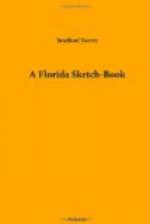Of one long forenoon’s ramble I retain particular remembrance, not on account of any birds, but for a half hour of pleasant human intercourse. I went out of the city by an untried road, hoping to find some trace of migrating birds, especially of certain warblers, the prospect of whose acquaintance was one of the lesser considerations which had brought me so far from home. No such trace appeared, however, nor, in my fortnight’s stay in Tallahassee, in almost the height of the migratory season, did I, so far as I could tell, see a single passenger bird of any sort. Some species arrived from the South—cuckoos and orioles, for example; others, no doubt, took their departure for the North; but to the best of my knowledge not one passed through. It was a strange contrast to what is witnessed everywhere in New England. By some other route swarms of birds must at that moment have been entering the United States from Mexico and beyond; but unless my observation was at fault,— and I am assured that sharper eyes than mine have had a similar experience,—their line of march did not bring them into the Florida hill-country. My morning’s road not only showed me no birds, but led me nowhere, and, growing discouraged, I turned back till I came to a lane leading off to the left at right angles. This I followed so far that it seemed wise, if possible, to make my way back to the city without retracing my steps. Not to spend my strength for naught, however (the noonday sun having always to be treated with respect), I made for a solitary house in the distance. Another lane ran past it. That, perhaps, would answer my purpose. I entered the yard, all ablaze with roses, and in response to my knock a gentleman appeared upon the doorstep. Yes, he said, the lane would carry me straight to the Meridian road (so I think he called it), and thence into the city. “Past Dr. H.’s?” I asked. “Yes.” And then I knew where I was.
First, however, I must let my new acquaintance show me his garden. His name was G., he said. Most likely I had heard of him, for the legislature was just then having a good deal to say about his sheep, in connection with some proposed dog-law. Did I like roses? As he talked he cut one after another, naming each as he put it into my hand. Then I must look at his Japanese persimmon trees, and many other things. Here was a pretty shrub. Perhaps I could tell what it was by crushing and smelling a leaf? No; it was something familiar; I sniffed, and looked foolish, and after all he had to tell me its name—camphor. So we went the rounds of the garden,—frightening a mocking-bird off her nest in an orange-tree,—till my hands were full. It is too bad I have forgotten how many pecan-trees he had planted, and how many sheep he kept. A well-regulated memory would have held fast to such figures: mine is certain only that there were four eggs in the mocking-bird’s nest. Mr. G. was a man of enterprise, at any rate; a match for any Yankee, although he had come to Florida not from Yankeeland, but from northern Georgia. I hope all his crops are still thriving, especially his white roses and his Marshal Niels.




